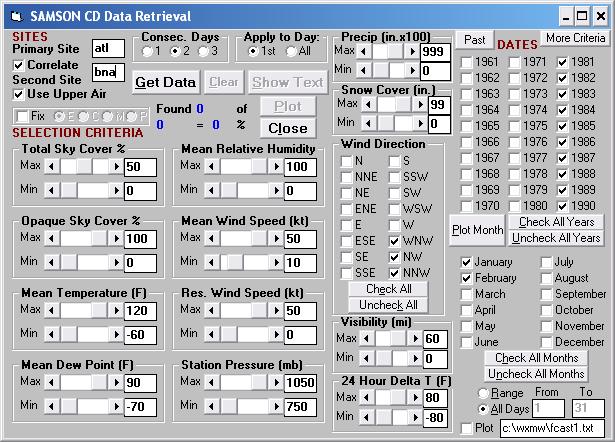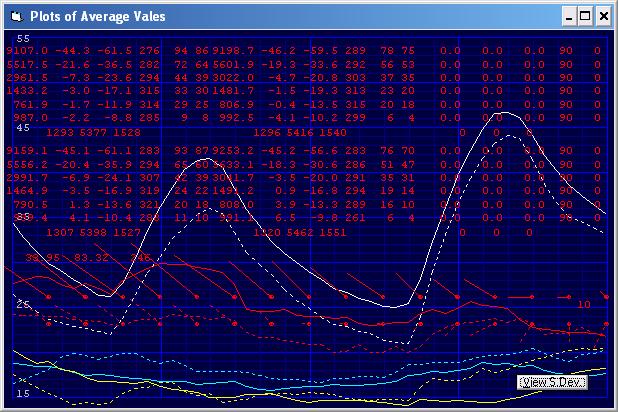Other Programs and Interests of Mine
WXSIM takes the majority of my programming time, and in fact the majority of my spare time (after work and family). Not complaining, though, as it's really interesting meeting people with similar interests from all over the world. With a daughter in college, the supplemental income is certainly welcome, too!
I do have some other interests, though, and I've written software associated with those, too, though none as highly developed as WXSIM. In the chance that some of my WXSIM customers might share one or more of these additional interests, here is a bit of information and links related to these other hobbies of mine:
Past Data Retrieval and Analysis
In the 1990's, I also wrote a program for analyzing data from the National Climatic Data Center's SAMSON CD-ROM, along with simutaneous upper air data (also from the NCDC). This program is one I've never shared, partly because the user would have to buy all that data from the NCDC and transfer a bunch of files. however, it is extremely powerful, and has contributed immensely to WXSIM's development. With up to 30 years of hourly data, from up to 237 stations (I've really used only a small fractin of that), I can effectively conduct restrospective, well-controlled experiments on weather and climate. The program can sift through thousands of days of data for a site, and find the 50 or so, say, meeting a stringent set of criteria. By altering one criteron and holding everything else constant, another 50 days of data can be retrieved and compared, to largely isolate the effect of that variable. Here is a screenshot of the program right before a query:

and here's the resulting plot, showing an average of many sets of 2-day periods, for Atlanta and Nashville, during northwest winds of over 10 knots in January and February, and cloud cover 50% or less. This is one of the ways I developed and tested WXSIM's advection routine, among other items.

I've written and used some other programs, especially in servie of WXSIM, but that's enough for now!
Running
I've been a pretty regular runner since about 1976. I competed 'officially' only my senior year in high school (in track and cross country), but I've often run road races after that, and I also coached track and cross country from 1990 to 2001, at the same school (Woodward Academy) from which I graduated.
Back during the early days of WXSIM (before I put it on the internet), I was also working on a running pace predictor model. I 'marketed' this program, called Runpaces, on a very small scale (maybe accumulating 20 customers over about a 10 year period). I worked really hard on it, and honestly think it's the best such model out there. Just this year, I finally updated it, cleaned it up a little, and have just now (in the last couple weeks) posted it on the internet again. It's got a demo and a low-cost full version. Hardly anyone knows about it, but if you are a runner, or know someone who is, please take a look, at www.runpaces.com.
Telescope Making
My astronomy interest actually predated my weather interest (age 6, versus 12 for weather). I've been kind of a telescope nut for a long time, and have made some of my own, including grinding, polishing, and figuring the primary mirrors. I've made four such mirrors (including two identical ones for a giant pair of binoculars - two 8 inch diameter telescopes in the same tube). I've also guided about half a dozen of my student through this process.
There's a elegant and extremely sensitive test for determining the shape of the mirror - the Foucault test. This basically consists of a couple of razor blades, a Christmas tree bulb, a knife edge, and a micrometer screw, and it can show defects in the mirror's figure down to less than a millionth of an inch. Analyzing the data from the test can be a pain, though, and is a perfect job for a computer program. In about 2000, I wrote such a program and gave it a nice graphical interface. My M.S. degree in Physics involved a concentration in optics, so I was able to apply some of that knowledge.
In the off-chance that you (or again, someone you know) is an ATM (Amateur Telescope Maker, though having an Automated Teller Machine for a friend could be handy, too!), take a look at ZoneTest. This one's just plain free.